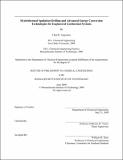| dc.contributor.advisor | Jefferson W. Tester. | en_US |
| dc.contributor.author | Augustine, Chad R | en_US |
| dc.contributor.other | Massachusetts Institute of Technology. Dept. of Chemical Engineering. | en_US |
| dc.date.accessioned | 2010-02-09T19:49:39Z | |
| dc.date.available | 2010-02-09T19:49:39Z | |
| dc.date.copyright | 2009 | en_US |
| dc.date.issued | 2009 | en_US |
| dc.identifier.uri | http://hdl.handle.net/1721.1/51671 | |
| dc.description | Thesis (Ph. D.)--Massachusetts Institute of Technology, Dept. of Chemical Engineering, 2009. | en_US |
| dc.description | This electronic version was submitted by the student author. The certified thesis is available in the Institute Archives and Special Collections. | en_US |
| dc.description | Includes bibliographical references. | en_US |
| dc.description.abstract | The purpose of this research was to study the various factors affecting the economic and technical feasibility of Engineered Geothermal Systems, with a special emphasis on advanced drilling technologies. The first part of the thesis was devoted to modeling and analysis of the technologies used to develop EGS projects. Since the cost of completing wells is a major factor in determining the economic feasibility of EGS projects, it is vital to be able to accurately predict in determining the economic feasibility of EGS projects, it is vital to be able to accurately predict their costs. Historic well cost data was analyzed to identify trends, and a drilling cost index for updating historic geothermal well costs to present day costs was developed. The effects of different advanced drilling technologies on drilling costs were estimated and incorporated into a techno-economic model to estimate their impact, as well as the impact of advanced reservoir stimulation technologies, on EGS levelized electricity costs. A technical analysis of geothermal binary Rankine cycle surface power plants was also performed to determine the effect of novel working fluids on plant efficiency for both sub- and supercritical binary cycles. The objective of the second part of the thesis was the application of thermal spallation drilling to deep boreholes. Thermal spallation is the fragmentation of a brittle solid into small, disc-like flakes by rapidly heating a confined fraction of the rock. It was proposed that the necessary temperatures and heat fluxes needed to induce thermal spallation in the high pressure, high density deep borehole environment could be achieved using hydrothermal flame technologies. An autoclave reaction system was designed and constructed to create flame jets in water at a pressure of 250 bar. The temperatures of these flames were measured, and attempts were made to use the flames to spall small rock samples. The experimental system was modified to study the centerline temperature decay of supercritical water jets injected at temperatures up to 525 °C into ambient temperature water. A device for measuring the heat flux from these jets was designed, constructed, and used to determine the heat transfer coefficients of the jets impinging against a flat surface. Together, these studies indicate that the necessary temperatures and heat fluxes required to induce thermal spallation in rocks can be achieved in a deep borehole. | en_US |
| dc.description.statementofresponsibility | by Chad R. Augustine. | en_US |
| dc.format.extent | 333 p. | en_US |
| dc.language.iso | eng | en_US |
| dc.publisher | Massachusetts Institute of Technology | en_US |
| dc.rights | M.I.T. theses are protected by
copyright. They may be viewed from this source for any purpose, but
reproduction or distribution in any format is prohibited without written
permission. See provided URL for inquiries about permission. | en_US |
| dc.rights.uri | http://dspace.mit.edu/handle/1721.1/7582 | en_US |
| dc.subject | Chemical Engineering. | en_US |
| dc.title | Hydrothermal spallation drilling and advanced energy conversion technologies for Engineered Geothermal Systems | en_US |
| dc.type | Thesis | en_US |
| dc.description.degree | Ph.D. | en_US |
| dc.contributor.department | Massachusetts Institute of Technology. Department of Chemical Engineering | |
| dc.identifier.oclc | 495728149 | en_US |
